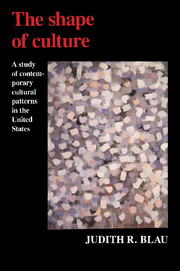Book contents
- Frontmatter
- Contents
- List of figures and tables
- Acknowledgements
- 1 Culture as structure and meaning
- 2 The American cultural landscape
- 3 Reproduction and decline
- 4 Co-occurrence, tipping in, and bridging
- 5 Organizational assembly and disassembly
- 6 Increasing returns on diminishing artists
- 7 A little more on the hobby horse
- 8 Masses and classes
- 9 The transformation of American culture
- Appendix A List of SMSAs and 1970 population in 100s
- Appendix B Sources and descriptions of cultural indicators
- Appendix C Log transformation
- Appendix D Polynomial term
- Index
- Other books in the series
4 - Co-occurrence, tipping in, and bridging
Published online by Cambridge University Press: 06 July 2010
- Frontmatter
- Contents
- List of figures and tables
- Acknowledgements
- 1 Culture as structure and meaning
- 2 The American cultural landscape
- 3 Reproduction and decline
- 4 Co-occurrence, tipping in, and bridging
- 5 Organizational assembly and disassembly
- 6 Increasing returns on diminishing artists
- 7 A little more on the hobby horse
- 8 Masses and classes
- 9 The transformation of American culture
- Appendix A List of SMSAs and 1970 population in 100s
- Appendix B Sources and descriptions of cultural indicators
- Appendix C Log transformation
- Appendix D Polynomial term
- Index
- Other books in the series
Summary
We had not peas nor strawberries here till the 8th day of this month. On the same day I heard the first whip-poor-will whistle. Swallows and martins appeared here on the 21st of April. When did they appear with you and when had you peas, strawberries, and whip-poor-wills in Virginia? Take notice hereafter whether the whip-poor-wills always come with the strawberries and peas.
Letter from Thomas Jefferson to Maria Jefferson (June 13, 1790)For all the credit given Jefferson as statesman, architect, and inventor, he is rarely noted in the annals of empirical science. Believing that matrices of cooccurring events would yield an understanding of the laws that governed nature, Jefferson searched for instances of combination and of the interdependence of phenomena. He maintained diaries of astronomical events, of rainfall, and of the first appearance and subsequent co-occurrence of about forty types of vegetables, using these data to speculate about “natural laws,” and, more pragmatically, to make decisions about ploughing, planting, and crop rotation.
Co-occurrence is an interesting problem for this investigation since a greater than chance probability of co-occurrence of two or more types of cultural suppliers in a large city provides an indication of either (1) organizational interdependencies, or (2) that critical masses involving substantial numbers of people share a taste for at least two types of culture.
- Type
- Chapter
- Information
- The Shape of CultureA Study of Contemporary Cultural Patterns in the United States, pp. 54 - 72Publisher: Cambridge University PressPrint publication year: 1989



